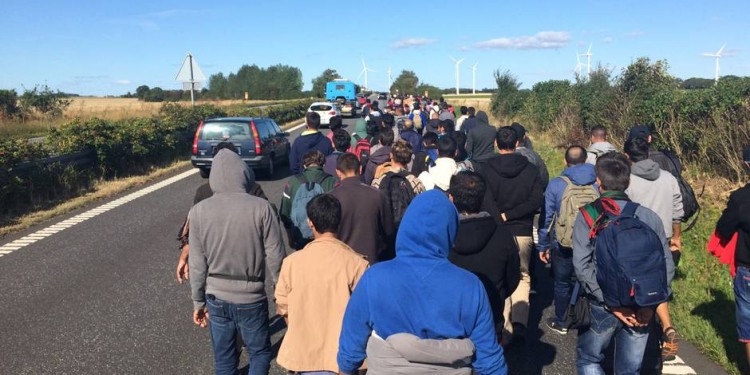System is not designed for refugees who do not want to stay in Denmark
The consequence of foreigners avoiding contact with Danish Police and not wanting to seek asylum in Denmark has been chaos at the Danish borders to Germany. Danish legislation is not designed for refugee seekers who do not want to stay here.
By Bente D. Knudsen Picture: Nica-free
The Udlændingelov, the Danish foreigner regulation, states that foreigners travelling in Denmark without legal papers (visa etc.) can be detained for up to 72 hours after which they must either be put before a judge, sent back to the country they came from or let go.
This is the situation facing Danish police at the borders to Germany in South Jutland and at Rødby on South Zealand. The sum up was given by Søren Ravn Nielsen from the Danish Police department of South Zealand to Danish newspaper Jyllands Posten.
As a consequence Danish National Police this morning allowed detained refugees to continue on their way. As has been indicated by many the desired destination is to a large extent Sweden, Norway or Finland. Apart from having heard that Denmark is not a good place to be because of recent restrictions, amongst other regarding family reunification for refugees, most were seeking to join family and friends already arrived in the other Scandinavian countries.
A Police decision and not a political one
It is Rigspolitiet, the Danish National Police who is responsible for coordinating the distribution of resources and give support to the police districts in charge of the local operational efforts.
“The Danish police continue to have a strengthened effort in the border areas, where we have received a large number of foreigners in recent days,” says Svend Larsen, Police Commissioner for the Danish National Police.
From mid-Sunday until Wednesday evening the Danish National Police estimate that approx. 3,400 foreigners have entered Denmark. Recent figures show that a majority are seeking to transit through Denmark as only about 700 are seeking asylum in Denmark.
“We have a very difficult task handling all of those who enter – especially because most of them do not want to contact us and be registered. We are talking about people, families and children, who have been travelling a long time from conflict areas, and Danish police are doing a lot to deal with this situation peacefully, using dialogue and patience,” says Svend Larsen.
The authorities are offering on-going humanitarian help and support to those arriving, but this is complicated by them avoiding contact and not wanting to be registered. The Danish Immigration Service processes asylum applications and provides information about the number of applicants currently estimated at 700.
Ferry and train traffic stopped
Wednesday afternoon the ferry arrivals at Rødby Havn and the train traffic from the south towards Padborg were affected for security reasons.
“The police are attempting to normalize the situation at the southern borders, but the large number of arriving persons that are not following our directions is making these efforts very difficult for us. For security reasons, we have been forced to close certain stretches of highway and stop train traffic. Also for security reasons, it has not been possible to continue sailing between Puttgarden and Roedby with trains on the ferries. We know that this causes significant irritation for many at the moment, but this is an extraordinary situation, where our main focus is protecting lives and avoiding that anyone comes to harm,” says Svend Larsen.
At a press conference Thursday afternoon the Danish authorities continually emphasized that Denmark is abiding by all international conventions in the present situation. Danish train operator DSB decided not to check passengers for tickets today in order to alleviate the immense pressure on the trains from the Danish border towards Copenhagen, calling it a matter of “conduit” due to the situation.


